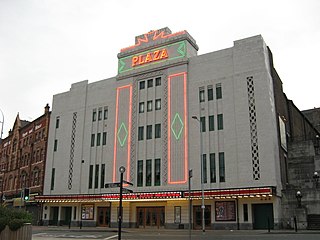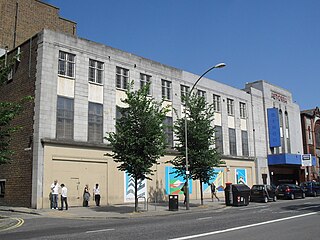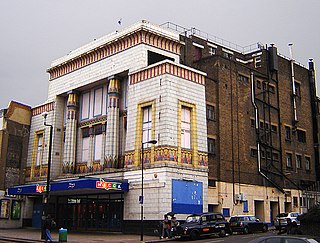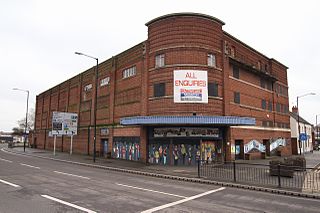
Tooting is a district in South London, forming part of the London Borough of Wandsworth. It is located 5 miles south south-west of Charing Cross.

Wandsworth is a London borough in South West London, England. It forms part of Inner London and has an estimated population of 329,677 inhabitants. Its main named areas are Battersea, Balham, Putney, Tooting and Wandsworth Town.

Gala Bingo is an online bingo and casino offering under the ownership of Entain.

The Point is an entertainment complex in Central Milton Keynes, Buckinghamshire, England. When it opened in 1985, it was called the UK's first multiplex cinema although the UK had introduced multi-screen cinemas in 1930 and had been increasing the number of screens in cinemas ever since. The front part of the building has a distinctive mirrored crystal ziggurat shape, framed by external steel beams at each corner, joined at the apex. Originally it had red neon lights connecting the apexes at each side, so that it looked like a pyramid at night.

Gaumont State Cinema is a Grade II* listed Art Deco theatre located in Kilburn, a district in northwest London.

The Plaza is a Grade II* listed art deco single-screen cinema and theatre in Stockport, Greater Manchester, England. It opened in 1932, its construction having involved the excavation of the sandstone cliff behind it. After an initial closure in 1966 and a subsequent period in use as a bingo hall by Rank Leiure, it has now been restored as a cinema and theatre, showing films and staging live shows.

Cecil Aubrey Masey was an English theatre and cinema architect, born on 28 December 1880 in Lambeth, London. Masey was a pupil of Bertie Crewe—with whom he worked on the Empire music hall in Edmonton of 1908—and from 1909, he went into partnership with architect Roy Young.

Troxy is a Grade II-listed Art Deco music venue on Commercial Road in Stepney, London. Built as a cinema in 1933, it closed in 1960 and became a training school for the London Opera Centre. In the 1980s the building was used as a bingo hall, and the Troxy was converted to a live events space in 2006. The building is considered a vital part of East London's history and was Grade II listed in 1990. It has a capacity of 3,100.

A number of Wurlitzer theatre organs were imported and installed in the United Kingdom in the period from 1925 to just before the Second World War (1939–45).

John Stanley Coombe Beard FRIBA, known professionally as J. Stanley Beard, was an English architect known for designing many cinemas in and around London.

The Astoria Theatre was a former cinema in Brighton, part of the English coastal city of Brighton and Hove. Built in 1933 in the Art Deco style for a local entertainment magnate who opened one of Brighton's first cinemas many years earlier, it was the first and most important expansion of the Astoria brand outside London. It initially struggled against the town's other "super-cinemas", but enjoyed a period of success in the 1950s and 1960s before rapid decline set in, culminating in its closure in 1977.

The Odeon at Kingstanding, Birmingham, was a 1930s cinema in the Odeon chain. Though closed as a cinema in 1962, the building survives as a bingo hall, and is Grade II listed.

Towers Cinema was a former cinema in Hornchurch, England. It was built in 1935 on part of the former Grey Towers estate and was noted for its Art Deco style of architecture. From 1973 it was used as a bingo hall until it closed in 2015. Despite the efforts of a local campaign to preserve the structure and to have it listed by Historic England, the building was demolished to make way for a Lidl supermarket.

The former Granada Cinema, also known as the Ebenezer Building or Cathedral of Christ Faith Tabernacle, in Woolwich, South East London, was built as a large and luxurious cinema in the 1930s. It had a seating capacity of nearly 2500 and is now being used as a church hall. The building with its extravagantly decorated interior is a Grade II* listed building.

The Embassy Cinema is a former cinema in the town of Chadwell Heath, Greater London. It was once known, among locals, as The Gaumont. It was designed in an art deco style, with a streamline moderne interior, by Harry Weston in 1934. The building is situated on the border of Redbridge and Barking & Dagenham, in the Chadwell Heath District Centre. The cinema closed in 1966 and became a Bingo Hall. In 2015, following the closure of the Bingo Hall, it was then used as a wedding hall/banqueting suite. The building was listed as an Asset of Community Value by the 'Chadwell Heath South Residents' Association' in August 2017 and is currently the focus of a major cinema restoration project.

The former Carlton Cinema is an Art deco Grade II* listed building, located at 161–169 Essex Road, Islington, London. It was completed in 1930 as a cine-variety theatre with a capacity of 2,226 seats.

Buzz Bingo is a chain of bingo clubs in Great Britain owned by Intermediate Capital Group. It has 82 locations. Formerly operating as Gala Bingo clubs, they were re-branded as Buzz Bingo clubs in September 2018, whilst the Gala brand continues to run its own online bingo and casino offerings under the ownership of Entain plc.

The Ritz Cinema is a Grade-II listed art-deco former cinema located on Abbey Street, Nuneaton. It was opened on 23 July 1937, originally for the Union Cinemas circuit, however, in October of the same year, ABC Cinemas would take over the building. The Ritz would stop showing films in 1984. After being used as a cinema, the building would be converted to a bingo hall, and trade as such until its closure.
Frank Ernest Bromige, commonly known as F.E. Bromige was a British architect of the Modernist and Art Deco styles. He is principally known for designing leisure buildings, especially cinemas, working mainly in Greater London and surrounding areas.



















